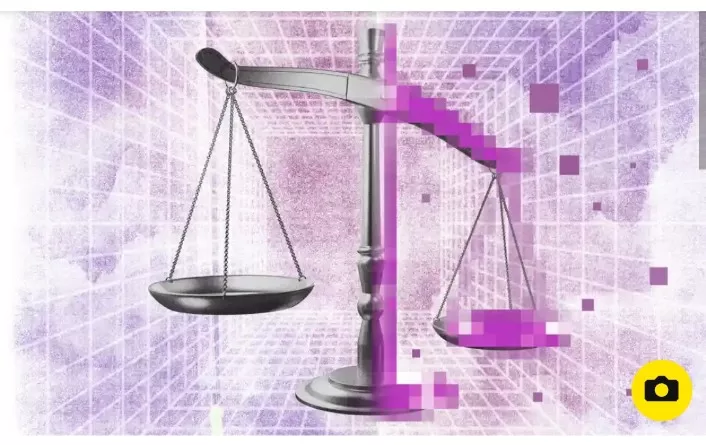In an epoch-defining transformation, the very bedrock of justice, symbolized by the scales of justice, metamorphoses into pixelated data. The clarion call for accountability reverberates across the technological realm, as luminaries within the artificial intelligence (AI) domain, including two revered “godfathers” of this innovation, issue a resounding warning.
This proclamation unfolded on Tuesday, amidst a convergence of global politicians, tech titans, erudite academics, and guardians of civil society, who are poised to convene at Bletchley Park next week for a pivotal summit on AI safety.
A co-author of the prescient policy prescriptions, penned by a consortium of 23 distinguished experts, contended that recklessly embarking on the quest for ever more potent AI systems, without comprehending the nuances of ensuring their safety, was a perilous endeavor.
Stuart Russell, the erudite professor of computer science at the University of California, Berkeley, solemnly declared, “It’s time to get serious about advanced AI systems. These are not mere playthings. Advancing their capabilities prior to comprehending the intricacies of their safety is a perilous voyage.”
He emphatically underscored the glaring discrepancy, asserting, “There exist more stringent regulations for neighborhood sandwich shops than there do for AI enterprises.”
The comprehensive document proffered several imperative guidelines for governments and stakeholders, including the allocation of a substantial one-third of AI research and development funds by governments and companies, exclusively dedicated to the safe and ethical utilization of AI systems.
Another pivotal recommendation is the imperative for independent auditors to gain unfettered access to AI laboratories, thus heralding a new era of transparency and accountability in this enigmatic sphere. Furthermore, the establishment of a rigorous licensing system for crafting cutting-edge AI models is advocated, while AI companies are implored to adopt specialized safety protocols in the event of identifying perilous capabilities within their creations.
Perhaps the most striking clarion call resonates with the idea of rendering tech companies liable for foreseeable and preventable harms arising from their AI systems, a paradigm shift that could profoundly transform the AI landscape.
Notable co-authors of this momentous document encompass Geoffrey Hinton and Yoshua Bengio, two of the esteemed “godfathers of AI,” who, in 2018, were laureates of the ACM Turing Award, considered the Nobel equivalent in computer science, in recognition of their groundbreaking contributions to the AI domain.
Intriguingly, the document posits that heedlessly designed AI systems hold the potential to magnify societal inequities, subvert established professions, destabilize the social fabric, enable large-scale criminal or terrorist activities, and erode the fundamental shared understanding of reality that underpins our society.
It is an ominous portent that existing AI systems are already displaying alarming capabilities, hinting at the imminent emergence of autonomous systems, endowed with the capacity to formulate plans, pursue objectives, and actively engage with the real world.
As the authors contend, the GPT-4 AI model, which powers the ChatGPT tool and was developed by the illustrious U.S. firm OpenAI, has demonstrated the ability to design and execute chemistry experiments, navigate the World Wide Web, and proficiently employ various software tools, including other AI models.
Intriguingly, the document postulates that the creation of highly advanced autonomous AI systems could inadvertently pave the way for autonomous entities that may unremittingly pursue undesirable objectives, potentially spiraling beyond human control.
The document encompasses a comprehensive repertoire of policy recommendations, encompassing mandatory reporting of incidents featuring unsettling AI behaviors, measures to forestall the replication of perilous AI models, and bestowing regulators with the authority to pause the development of AI models exhibiting hazardous behaviors.
The imminent safety summit promises to be a pivotal platform for deliberating existential threats posed by AI, particularly in terms of enabling the development of novel bioweapons and circumventing human oversight. Notably, the United Kingdom government, in conjunction with other stakeholders, is in the process of drafting a statement that is expected to underscore the gravity of the menace posed by frontier AI, denoting advanced AI systems. Nevertheless, while the summit is poised to outline the perils associated with AI and suggest measures to combat them, the establishment of a global regulatory body remains an aspiration, rather than an imminent reality.
In the throes of these deliberations, it is worth noting that some AI luminaries, such as Yann LeCun, co-winner of the 2018 Turing award alongside Bengio and Hinton, and currently serving as the chief AI scientist at Mark Zuckerberg’s Meta, have questioned the cataclysmic notion that AI could herald the extermination of humanity. Nonetheless, the authors of this prescient policy document argue that, should advanced autonomous AI systems materialize today, the world remains inadequately equipped to ensure their safety and conduct the requisite safety assessments. As they soberly posit, “Even if we did, most nations lack the institutions to prevent misuse and uphold safety standards.”
The clarion call for responsibility and vigilance echoes resoundingly across the AI landscape, a potent reminder that, in the realm of AI, the mantle of accountability must be shouldered with utmost gravity and prudence.




